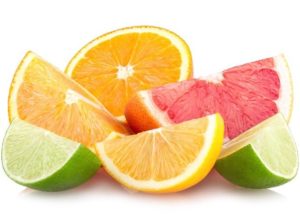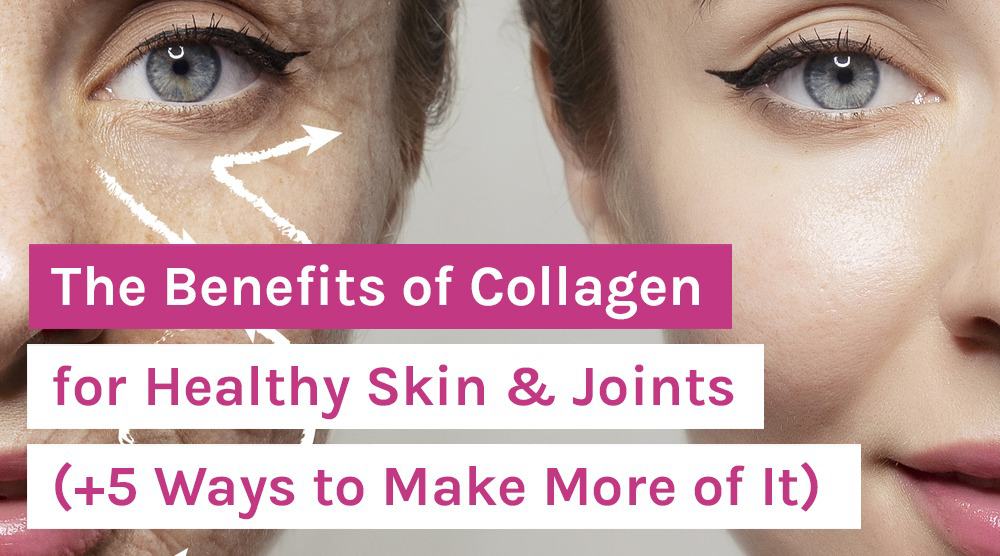The Benefits of Collagen for Healthy Skin & Joints (+ 5 Ways to Make More of It)
In a hurry? Click here to read the Article Summary...
What do wrinkles, creases, and stiff, painful joints have in common? They’re all signs indicating that your body’s collagen levels may be critically low and in need of urgent replenishing.
Unfortunately, collagen levels start to decline when we’re barely in our mid-20s. And things get worse as we grow older. For instance, collagen breaks down four times faster in people in their 80s, relative to when they were back in their 20s.
But what is collagen, what are the benefits of collagen, and how can we maintain its levels so that we can remain healthy as we age?
What is Collagen and What Does It Do?
Collagen is a protein. Indeed, it is the most abundant protein in the body, along with being a key building block component in all of the body’s connective tissues.

You may be surprised to learn that collagen makes up to 30% of all the proteins in your body and a staggering 70% of the proteins in your skin!
The musculoskeletal system is made up of the skeleton, muscles, cartilage, tendons, ligaments, joints, and other connective tissue that supports and holds tissues and organs together. Collagen helps to construct the infrastructure of the musculoskeletal system, which provides your body with form, support, stability, and movement.
Collagen also ensures the cohesion, elasticity, and regeneration of your skin, which is directly related to how youthful you look. In other words, maintaining your body’s collagen level is the key to having glowing, wrinkle-free skin, and countering the effects of aging and pollution.
The dermis – the layer of skin that provides the skin’s foundation – is partly responsible for your skin’s elasticity and flexibility and also helps to cushion your body from stress and strain. No surprises then that collagen is the main component of the dermis. Breakdown of collagen or not having enough of it in your body is what leads to wrinkle formation and other skin problems.
Ligaments are a type of connective tissue that attach two bones to each other and hold your joints together. Similarly, tendons are another type of connective tissue that keeps your muscles attached to your bones. All of these – bones, ligaments, tendons, and muscles – are made up of proteins. Once again, their predominant protein component is collagen.
In other words, having enough collagen helps to ensure the health and self-renewing capability of your skin, hair, tendons, cartilage, bones, and joints, as well as your blood vessels and gut.
Types of Collagen
Our bodies actually contain more than 20 different types of collagen, but three of these – known as types I, II, and III – together make up 80% to 90% of all the collagen in the body. Types I and III are found mainly in the skin, tendons, ligaments, and bones, while type II is the main component in joint cartilage.
Collagen Is Made of Amino Acids
Collagen is made up of components known as amino acids, including glycine, proline, hydroxyproline, and arginine. Constantly replenishing these amino acids via your diet is needed to maintain your body’s collagen at healthy levels.
If you don’t get enough of the amino acids that are required to make collagen, you will not be able to make enough of it to meet your body’s needs.
What Happens to Collagen as We Grow Older?
As we age, our body’s ability to make collagen begins to slow down. As a  consequence, our skin, hair, tendons, cartilage, bones, joints, blood vessels, and gut start losing their strength and structural integrity.
consequence, our skin, hair, tendons, cartilage, bones, joints, blood vessels, and gut start losing their strength and structural integrity.
Our skin becomes fragile and less elastic. Wrinkles start to appear. Our hair turns grey, our joints lose their flexibility and become stiff, and our bone quality begins to deteriorate.
The good news is – even if we cannot make the same levels of collagen as we once did, stimulating our innate collagen production can potentially reverse some of these signs and symptoms of aging.
For instance, a double-blind, placebo study published in 2014 by Proksch and colleagues looked at the role of supplemental collagen peptide in eye wrinkle formation.
A total of 114 women, aged 45 to 65 years, received either the collagen peptide or control, once daily for 8 weeks. Eye wrinkles were measured before starting the treatment, after 4 and 8 weeks, as well as 4 weeks after the last intake.
Consumption of collagen peptide was seen to lead to a statistically significant reduction of eye wrinkle volume by up to 20 percent – and this effect was long-lasting.
The authors also detected significantly higher levels of procollagen type I and elastin in the treated volunteers, suggesting that supplemental collagen boosted the body’s own production of collagen, which may have helped reduce eye wrinkle formation.
5 Ways to Replenish Your Collagen Levels
Here are 5 ways to help maintain healthy collagen levels as you age:
#1. Collagen Supplements are produced from the connective tissue of animals and are commonly used to replenish collagen levels. In its natural state, collagen is made up of large molecules, which are “hydrolyzed,” or broken down into smaller molecules called peptides for better absorption.
Studies have shown that collagen peptides are indeed well absorbed and can trigger the body’s own collagen production. For instance, supplements of hydrolyzed types I and III collagen have been shown to increase collagen levels in the skin and also support tendons and ligaments, helping with exercise recovery.

A 2008 study by Clark and colleagues examined the effects of collagen hydrolysate on activity-related joint pain in 147 athletes, of whom 73 received the collagen supplement while 74 received control treatment for 24 weeks.
The results of this study clearly showed that athletes consuming collagen hydrolysate had less joint pain – while at rest while standing, walking, or lifting – all of which can have a negative impact on athletic performance if left untreated.
In osteoarthritis, injury or wear and tear break down the cartilage, eventually causing the bones to rub together. On the other hand, rheumatoid arthritis is an autoimmune disease in which inflammation causes pain, stiffness, and swelling. Collagen supplements have been shown to help support joint health, which is highly beneficial for arthritis sufferers.
#2. Bone Broth has been used as a healing concoction in traditional cultures for centuries. Bone broth is made from nothing more than water, animal bones, vegetables, and seasoning.
Often the bones are roasted first, before simmering for very long periods of time, usually more than 24 hours – so that not only gelatin (which is a hydrolyzed form of collagen), but also many healthful minerals, are released into the broth.
Bone broth is very rich in the amino acids glycine and proline. Glycine supports detoxification, while proline supports skin health, especially in combination with vitamin C. Gelatin also supports skin health and tone. Bone broth also contains glucosamine and chondroitin sulfate, which combine to support healthy cartilage.
Additionally, bone broth contains hyaluronic acid (also found in beans and root vegetables) which is given on its own as a supplement to osteoarthritis patients and is also injected into knee joints to reduce pain, along with increasing knee function and mobility.
All these many powerful nutrients in bone broth greatly contribute to joint health which in turn may help to prevent inflammation-induced breakdown processes and improve overall mobility.
#3. Low-level laser therapy (LLLT) is a fast-growing technology that is being used to treat many conditions that require stimulation of innate healing processes, relief from pain and inflammation, and restoration of normal function.
Laboratory studies have shown an increase in production of pro-collagen and collagen along with other skin healing factors after skin exposure to low-energy laser irradiation.
#4. Vitamin C is essential for collagen production in the body, by direct  activation of collagen production, by serving as a co-factor for two enzymes that are responsible for stabilizing collagen molecules, and by other mechanisms.
activation of collagen production, by serving as a co-factor for two enzymes that are responsible for stabilizing collagen molecules, and by other mechanisms.
Clinical studies have shown that applying vitamin C directly on the skin increases collagen production. Consuming vegetables and fruits rich in vitamin C and other antioxidants also helps maintain collagen levels in the body.
#5. Aloe vera has been shown to nearly double hyaluronic acid and collagen production when consumed by study participants. In laboratory experiments, naturally occurring compounds present in Aloe vera known as sterols have been shown to promote the production of type I and type III collagen.
Other Health Benefits of Collagen
Other benefits of boosting your body’s natural collagen production include supporting good hormonal balance, as research shows that the specific amino acids in collagen can help to improve the amino acid balance in the body, thereby supporting the body’s natural hormone production.
Both gelatin – a hydrolyzed form of collagen – and bone broth are known to help heal the gut lining. “Leaky gut syndrome” is a health condition in which partially digested food, toxins, viruses, yeast, and bacteria are able to enter the bloodstream from the intestine, which is harmful to your health.
Leaky gut is believed to be the root cause of many allergies, autoimmune disorders, and even neurological disorders such as autism, ADHD, and learning disabilities.
By sealing the gut and optimizing the immune system, collagen supplementation, as well as bone broth consumption, can help to support overall gut health which lowers the risk of getting these disorders.
 “Collagen is the literal glue that keeps our body, tissue and bones held together and functioning optimally. Combine the aging process with common health conditions and diseases and the need for collagen becomes essential. I routinely recommend cleanly sourced multi collagen peptides to my patients because there are vast benefits for patients who experience vascular disorders, gut imbalances, spine and disc diseases, dental remineralization delays, eye problems, hair loss and saggy, wrinkly skin. Collagen can help slow down and reverse the aging process.” – Dr. Melissa Gallagher, Naturopathic Physician
“Collagen is the literal glue that keeps our body, tissue and bones held together and functioning optimally. Combine the aging process with common health conditions and diseases and the need for collagen becomes essential. I routinely recommend cleanly sourced multi collagen peptides to my patients because there are vast benefits for patients who experience vascular disorders, gut imbalances, spine and disc diseases, dental remineralization delays, eye problems, hair loss and saggy, wrinkly skin. Collagen can help slow down and reverse the aging process.” – Dr. Melissa Gallagher, Naturopathic Physician
Organixx Clean Sourced Collagens blend contains five types of collagen from four sources. What’s more, it’s combined with targeted nutrients such as zinc, vitamin C, and vitamin B6 which specifically enhance the bioavailability and potency of collagen. Clean Sourced Collagens is formulated from the ground up to enhance and support your body’s natural ability to heal and rebuild itself from the INSIDE out.

 Sources:
Sources:
Article Summary
Collagen makes up to 30% of all the proteins in your body and a staggering 70% of the proteins in your skin!
Maintaining your body’s collagen level is the key to having glowing, wrinkle-free skin, and countering the effects of aging and pollution.
Having enough collagen helps to ensure the health and self-renewing capability of your skin, hair, tendons, cartilage, bones, and joints, as well as your blood vessels and gut.
Collagen is made up of components known as amino acids, including glycine, proline, hydroxyproline, and arginine. Constantly replenishing these amino acids via your diet is needed to maintain your body’s collagen at healthy levels.
5 ways to help maintain healthy collagen levels as you age:
- Collagen supplements
- Bone broth
- Low-level laser therapy (LLLT)
- Vitamin C
- Aloe vera
By sealing the gut and optimizing the immune system, collagen and gelatin supplementation as well as bone broth consumption can help to support overall gut health.
A healthy gut is believed to reduce the risk of getting autoimmune disorders, and even neurological disorders such as autism, ADHD, and learning disabilities.




I've been trying for several days to order from your website. I've messed up every time & have been unable to complete the order. It seems that I'M only able to order 1 product at any given time because when I switch to another kind of product everything goes haywire. I've been trying to order your Essential Oil Book & your Bone Broth Protein, Collagen, Probiotics Bundle. Do you have a phone number where I can attain these items rather than ordering them online? Please help!
Very informative, where can I get the type ll collagen. My hip cartilage is worn out in my hip. And I don't want surgery. Thank you
Dr axe has a video about the 5 different types of collagen and their sources.
Amazon
Where can I buy this collagen powder, or is it in the bone broth powder that you sell?
Nancy,
Our bone broth protein does contain collagen. For more information about it please visit this website: https://shop.organixx.com/products/bone-broth-protein
Any tips for vegetarians in all this?